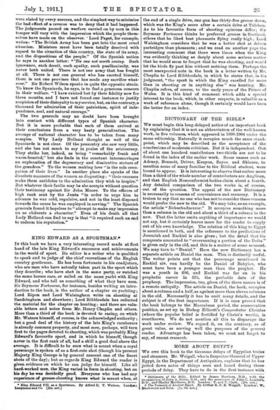MORE ABOUT EGYPT. - t- WE owe this book to the tiresome
delays of Egyptian trains and steamers. Mr. Weigel], who is Inspector-General of Upper Egypt, in the Department of Antiquities, explains that he has jotted down notes of things seen and heard during these periods of delay. They have to do in the first instance with * Dictionary of the DibLe. Edited by James Beatings, D.D., with the co-operation of John A. Sethi*, D.D., and the assistance of John C. Lambert. D.D., and Shaffer 3fatthews, D.D. London: 1'. and T. Clark. [20s. net.] The Treasury of Ancient Egypt. By Arthur E. P. B. Weigel!. London : W. Blackwood and Sons. L7s. 6d. net.] the past, but now and then we have a not less interesting reference to the present. Such we find in the chapter on Philae. The island is submerged in the great Aswan Reservoir. But it is submerged for five months only out of the twelve, and during the period when the ruins are visible and accessible there is ample time for effecting such repairs as may be wanted. Of course it is a pity that the thing had to be done, but the reservoir has vastly increased the wealth of Egypt, and the place chosen for it was in every way the best. Then there is a chapter on "Theban Thieves." Here, again, the ideal arrangement would be that every relic should be left in situ. It does seem a shame that the mummy of a Pharaoh should be taken from the tomb on which he spent an incalculable amount of his people's labour and carried to a far-off museum. Still, it has to be done. The experiment was tried in the case of Amenhotep II. at Thebes. The mummy of the king was put into the sarcophagus, and a funeral boat was left in the tomb-chamber. Not long after the tomb was found broken open. The boat was gone ; the mummy lay upon the floor with its chest broken in—doubtless in search of the gold with which, in the peasants' belief, all mummies are stuffed. The watchmen—for this precaution had not been neglected—told a cock-and-bull story of how they had been attacked and overpowered. The fact is that this practice of tomb-robbing is at least three thousand years old in Egypt. Then there is a highly interesting chapter on the survival in modern times of ancient Egyptian magic. Grave citizens will tell you, as experiences of their own, tales that might have come straight out of the Arabian Nights. Then we have chapters of Ancient Egypt with nothing of the modern except the excavator. Such is the tale of how the tomb of Yuaa and Tuan, his wife, was found in the Valley of the Tombs of the Kings at Thebes. It was like a modern house that had been shut up for a few weeks. Three arm- chairs decorated with gold were there—one of them with a down pillow covered with linen which looked quite new—artistically worked boxes, two comfortable beds with springy string mat- tresses, the light chariot which Yuaa had used, his staff, his sandals—a new pair and an old—and, in two lidless coffins, the dead man and his wife. "As one looked into their quiet faces there was almost the feeling that they would presently open their eyes and blink at the light." Mr. Weigall has made excellent use of the unusual opportunities which have come in his way.















































 Previous page
Previous page